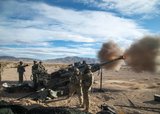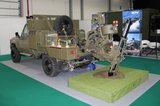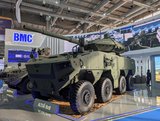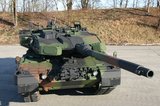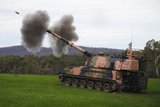US Army eyes interim cruise missile defence
The US Army is looking to field an interim cruise missile defence capability to provide near-term protection until the longer-term Indirect Fire Protection Capability (IFPC) system becomes fully operational, according to a service official.
The army has evaluated ‘a number’ of existing systems for the interim capability, including Israel’s combat-tested, anti-rocket Iron Dome, and has ‘winnowed that down to a very small set of candidates,’ army acquisition chief Bruce Jette said on 10 January.
‘We want to have some things in place that provide us some immediate protection…and so what that’s going to do is we’re going to look
Already have an account? Log in
Want to keep reading this article?
More from Land Warfare
-
![US Army plans Q2 prototype proposal request for its Mobile Tactical Cannon programme]()
US Army plans Q2 prototype proposal request for its Mobile Tactical Cannon programme
The US Army is seeking a mature 155mm, wheeled, self-propelled capability to replace the towed M777 howitzer in the Stryker, Mobile and Infantry Brigade Combat Teams as it targets a potential 498-unit acquisition goal.
-
![British Army’s Project Stokes 120mm mortar bids due in March 2026]()
British Army’s Project Stokes 120mm mortar bids due in March 2026
Project Stokes could see a new 120mm mortar capability enter British service, with domestic production and international partnerships central to competing bids.
-
![World Defense Show 2026: Large vehicles and counter-drone systems take the limelight]()
World Defense Show 2026: Large vehicles and counter-drone systems take the limelight
Visitors who attended the first World Defense Show four years ago continue to speak of the difficulties they faced with poor facilities and power problems. This year’s event emphasised its status as one of the major defence expositions and as a place where regional players and those less welcome at other shows could take centre stage.
-
![MKJ Warrior Series — The Nett Warrior Qualified Connector for Today’s Soldier Systems]()
MKJ Warrior Series — The Nett Warrior Qualified Connector for Today’s Soldier Systems
ITT Cannon’s MKJ Warrior connectors are designed for the harshest environments, delivering mission critical comms, navigation and USB data/power.
-
![Active vehicle protection comes to the forefront as Trophy and Iron Fist secure contracts]()
Active vehicle protection comes to the forefront as Trophy and Iron Fist secure contracts
Experience on the battlefield is accelerating the adoption of active protection systems as technologies continue to evolve to reflect shifting global defence needs.
-
![World Defense Show 2026: Hanwha increases Middle East presence and reveals Tigon 6x6 sale]()
World Defense Show 2026: Hanwha increases Middle East presence and reveals Tigon 6x6 sale
Shephard sat down with Hanwha Middle East and Africa president Sung Il at World Defense Show 2026 to hear about the company’s plans for the region and how it plans to use local industry success to win deals.











